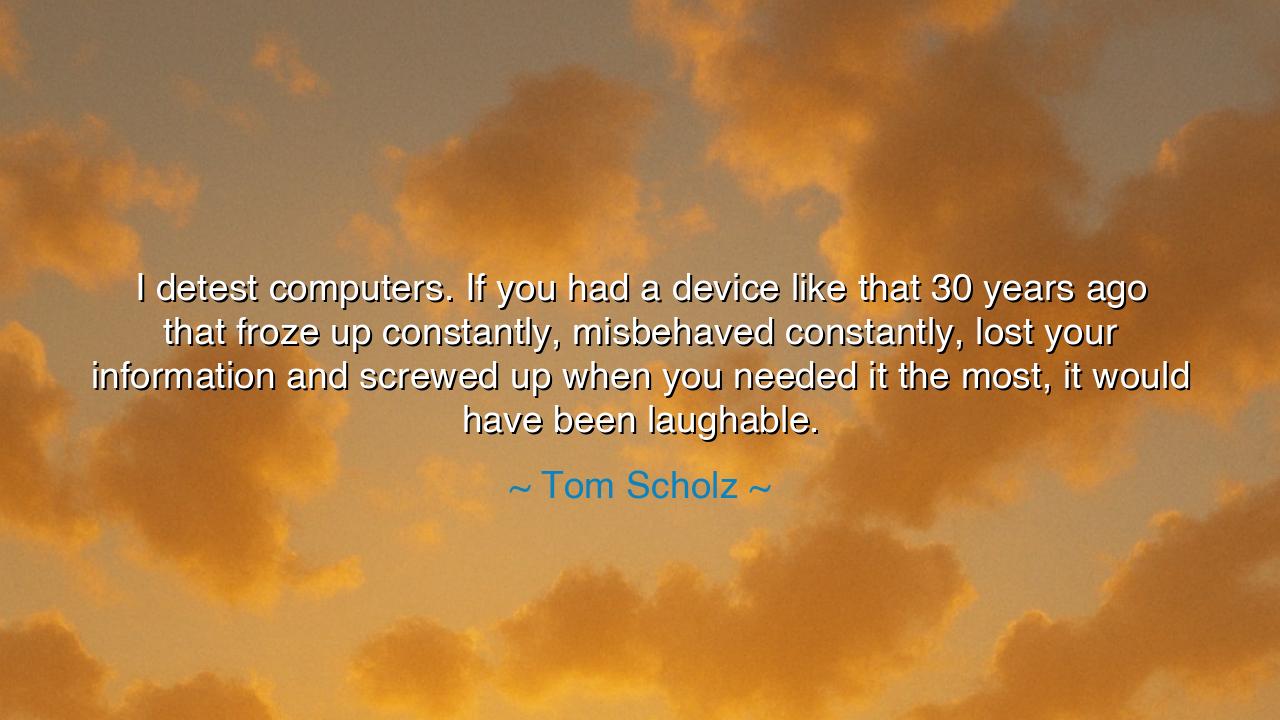
I detest computers. If you had a device like that 30 years ago
I detest computers. If you had a device like that 30 years ago that froze up constantly, misbehaved constantly, lost your information and screwed up when you needed it the most, it would have been laughable.






There was once a time when creation was born not from circuits or screens, but from hands, from craft, and from patience. It was in such a spirit that Tom Scholz, musician, inventor, and the architect of the band Boston, uttered these fiery words: “I detest computers. If you had a device like that 30 years ago that froze up constantly, misbehaved constantly, lost your information and screwed up when you needed it the most, it would have been laughable.” His voice was not merely one of frustration — it was the cry of a craftsman mourning the loss of reliability, the lament of one who saw technology promise mastery but deliver mediocrity. His words ring not against progress itself, but against the illusion of progress when it is hollow, careless, or soulless.
To understand the force of this saying, one must know Tom Scholz — a man of both science and art, an engineer from MIT who built his own recording equipment in his basement before his music changed the sound of rock forever. He lived in an age when creation was tangible — knobs turned by hand, wires soldered with care, sound shaped by the ear, not the algorithm. To him, the computer, with all its glitches and fragility, was a mockery of that sacred trust between man and his tools. For what good is the machine that falters at the moment of need? What worth is innovation if it steals time rather than saving it? In this, Scholz speaks not only for himself but for all who labor with their hands and hearts — who seek excellence, not ease.
His words recall an older truth, known to the builders of temples and ships and symphonies alike: that a tool is only as noble as the discipline behind it. When the carpenter’s chisel broke, he mended it; when the scribe’s ink spilled, he started anew. Their creations endured centuries because they were born from endurance, not convenience. Yet in our age, men have become servants to their tools. The computer, that supposed instrument of perfection, crashes without warning and demands endless updates like a fickle god. It has given us power, yes — but also impatience, dependency, and forgetfulness of skill.
Remember the tale of the Apollo engineers, who sent mankind to the moon using computers with less power than the phones in our pockets. Their machines did not boast of brilliance; they obeyed the steady minds of those who built them. There was no luxury of error, no room for “crashes.” Every calculation was an act of devotion, every keystroke a pledge to precision. Those men would have looked upon today’s fragile devices — prone to freezing, losing data, collapsing under their own weight — and, as Scholz said, found them laughable. For they would ask: how did humanity come so far, only to make its instruments less reliable than before?
Yet let us not mistake this condemnation for hopelessness. Scholz’s anger hides a deeper reverence — a yearning for craftsmanship and excellence. His detestation is not of the computer itself, but of the carelessness with which men wield it. He calls us, perhaps unknowingly, back to a sacred balance: to marry innovation with integrity, progress with patience, convenience with conscience. For the machine should serve the spirit, not enslave it. A tool, no matter how advanced, is but an extension of the will that guides it — and when that will is lazy or thoughtless, even the most brilliant invention becomes a farce.
Take heed, then, O listener of this modern age. Do not place your faith in the false idols of speed and automation. When your device fails, do not curse the machine alone — ask instead whether your dependence has made you fragile. When you create, strive to create well. When you use, strive to use wisely. Let your mind, not the mechanism, be the source of mastery. A computer may falter, but a disciplined mind will not.
For the lesson of Scholz’s words is eternal: true craftsmanship endures beyond the tool. Whether in music, art, or invention, the spirit of creation must not be surrendered to the convenience of the moment. Reclaim the pride of builders past — those who shaped stone, wood, and melody with reverence. Let technology be your servant, not your sovereign. Then, when your works are tested by time — unlike the machines that fail and fade — they shall stand, steadfast and unbroken, bearing the mark of something greater than any circuit: the enduring hand of the human soul.






AAdministratorAdministrator
Welcome, honored guests. Please leave a comment, we will respond soon